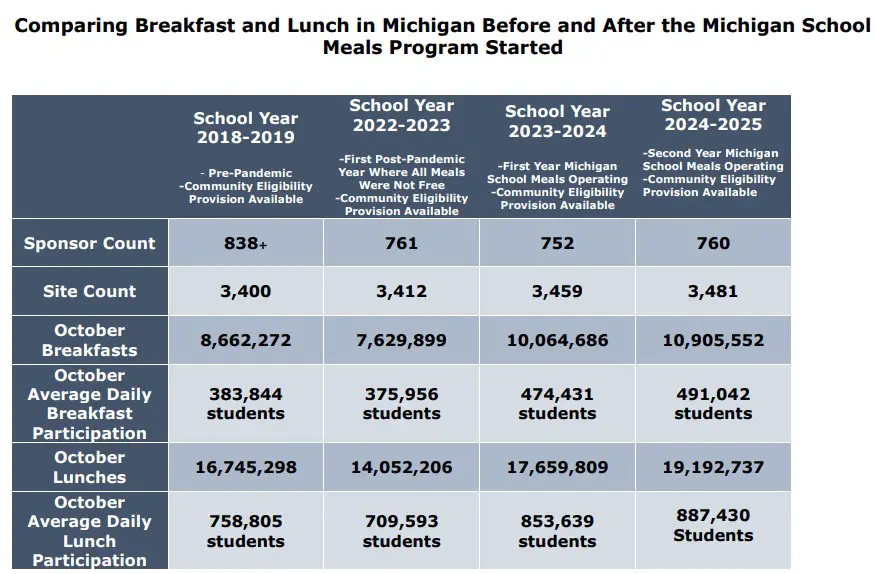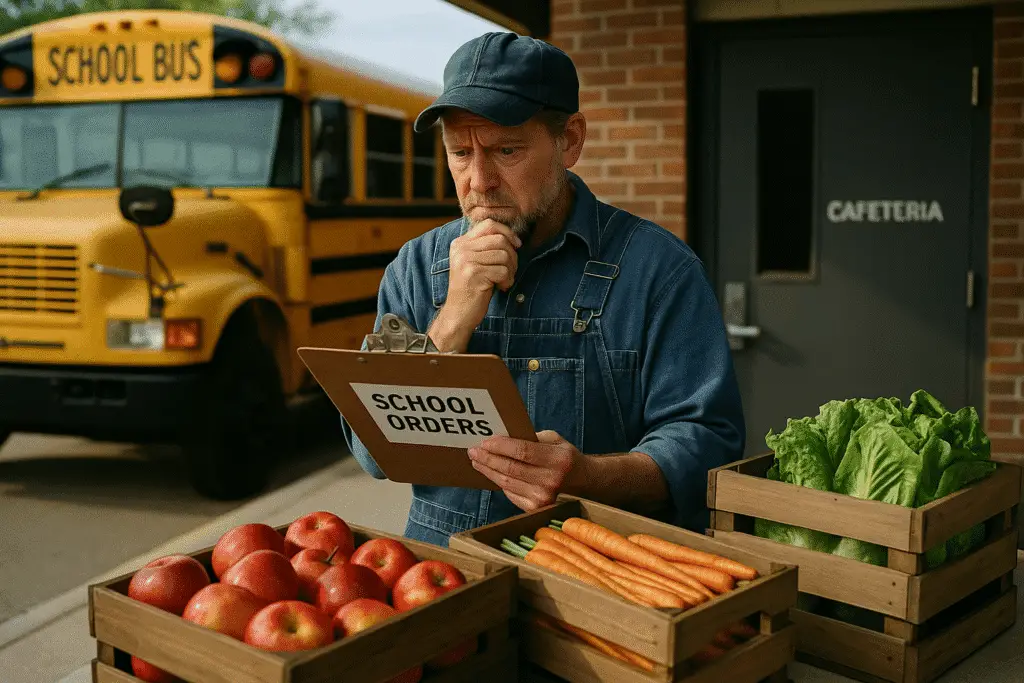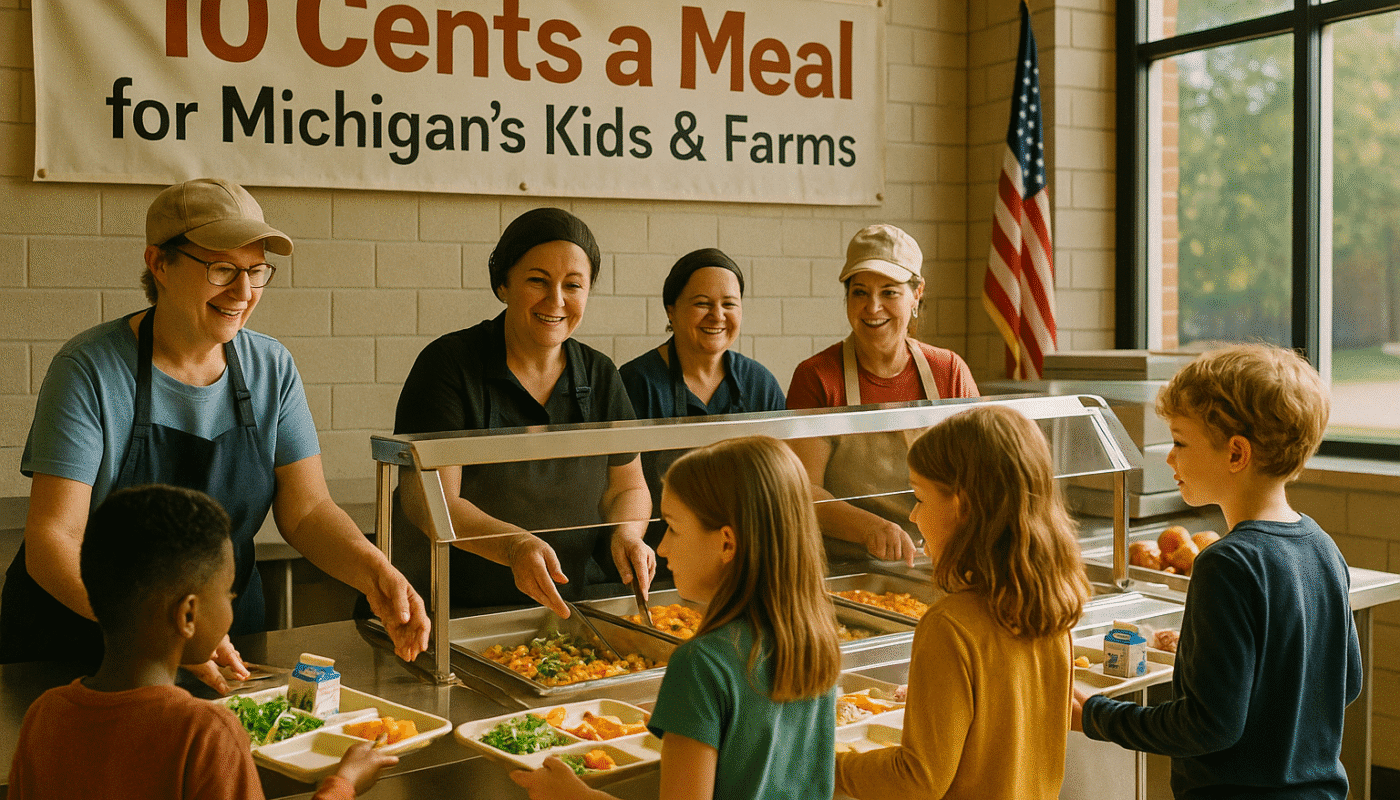Proposed federal cuts could undermine Michigan’s growing free school meal program, which is credited with boosting student nutrition and academic success.
Federal Proposal Threatens Universal Free Meals in Michigan Schools
LANSING – A federal budget proposal aiming to restrict eligibility for free or reduced-price school meals has drawn concern from Michigan officials, who cite sharp increases in student participation and academic benefit since the launch of the Michigan School Meals initiative.
The U.S. House is considering cuts that would end universal meal access in many states. If approved, the change would disqualify millions of students across the country from free breakfasts and lunches, according to data from the Food Research & Action Center, a leading nonprofit anti-hunger advocacy group.
In response, the Michigan Department of Education (MDE) reaffirmed the importance of universal meals during this week’s State Board of Education meeting. “Nutrition and wellness education are essential to help build strong and healthy communities,” said Mandy Sosnowski, Director of Food and Nutrition Services for Utica Community Schools. Her district, like many others, has reported dramatic increases in student meal participation since the program began.
Michigan School Meals Shows Major Growth in Student Participation

According to state-provided data, the Michigan School Meals program has produced significant gains:
- October 2023 saw 10.9 million breakfasts served, up from 7.6 million in 2022 and 8.6 million pre-pandemic in 2018.
- October lunch participation climbed to 19.1 million in 2024, compared to 17.6 million in 2023 and just 14 million in 2022.
These increases translate into daily participation rates of over 887,000 students for lunch and 491,000 for breakfast, indicating widespread impact across public schools statewide.
Sosnowski noted that Utica Schools saw a 63% increase in breakfasts served and a 69% increase in lunches since joining the program. “Because of Michigan School Meals, we were able to hire a registered dietitian,” she said, “not only focusing on classroom education but also leading community wellness events.”
Universal Meals Linked to Better Performance and Equity
Under the Michigan School Meals program, all public school students receive one free breakfast and lunch daily, thanks to a combination of federal reimbursements and state funding that bridges the financial gap. Michigan is one of only eight states offering this universal access, which also helps reduce lunch shaming and administrative burdens.
“Students who benefit from nutritious meals during the school year and the summer have a better opportunity to achieve and to perform well in school,” said State Superintendent Dr. Michael F. Rice. He tied the program to Goal 3 of Michigan’s Top 10 Strategic Education Plan, which aims to improve student health, safety, and wellness.
Home-Grown Nutrition Supports Local Farms and Learning

The program also boosts local agriculture. Through 10 Cents a Meal for Michigan’s Kids & Farms, schools receive grants to purchase Michigan-grown produce, incorporating local food into menus and nutrition education efforts.
1. Decreased Demand for Michigan-Grown Produce
The 10 Cents a Meal for Michigan’s Kids & Farms program provides matching funds for schools to purchase locally grown fruits, vegetables, and legumes. This program is directly tied to school meal participation. If fewer meals are served due to loss of universal access, purchasing power for local food declines.
- In SY 2024–25, the state projected over $59.5 million in USDA Foods value flowing through Michigan schools. A drop in participation could significantly shrink that number.
- School districts may revert to lower-cost bulk suppliers, often sourcing from out-of-state or international providers.
2. Disrupted Farm-to-School Relationships
Many Michigan farmers have developed long-term relationships with school districts through cooperative buying programs and regional food hubs. Reducing meal volume or program scope would:
- Disrupt those supply chains.
- Undercut regional distribution infrastructure.
- Limit crop planning and price stability for small and mid-size growers who rely on institutional buyers.
3. Reduced Economic Multipliers in Rural Communities
According to data from Michigan State University Extension and the USDA, every dollar spent on local food can generate $1.80 to $2.60 in local economic activity. Pulling state and federal dollars from school cafeterias:
- Removes income from farmers and food processors.
- Shrinks job opportunities in rural supply chains (trucking, warehousing, processing).
- Reduces reinvestment in local equipment, services, and community spending.
4. Potential Farm Program Cutbacks
If schools reduce their local food purchasing, farmers may:
- Stop participating in the 10 Cents a Meal program due to lower returns or inconsistent demand.
- Scale back production of fresh produce for institutional use and shift to less profitable or lower-risk crops.
- Face reduced state matching funds tied to participation rates.
The ripple effect of cutting universal school meals would be felt far beyond the cafeteria. For many Michigan farmers—especially those supplying fresh, seasonal, and specialty crops to schools—this policy shift would represent a direct loss of stable, predictable income. It would also undermine years of progress in connecting Michigan agriculture to public institutions and youth nutrition.
What’s at Stake if Congress Moves Forward
The proposed federal restrictions would jeopardize these gains. Without universal access, schools would revert to means testing and administrative screenings, potentially reviving lunch debt and stigmatizing lower-income students.
With participation at its highest levels since the pandemic, MDE officials say the state has shown the value of state-federal partnership. “This is not the time to move backward,” one official noted during the board meeting.
Find More Interesting Feature Stories From ThumbWind
- Michigan Feature Stories – Unveiling the diverse and vibrant people, captivating places, and remarkable events that come together to make the Great Lake State unique and cherished by both residents and visitors alike.
- Weird Political News – A sarcastic take on official news from around the U.S., exploring the absurdities that often arise in the political landscape while providing a humorous perspective on current events and highlighting the quirks of politicians and policies.
- Michigan News – News and events from Michigan’s Upper Thumb region worth knowing, including local stories, impactful interviews, and updates on community happenings that shape the culture and lifestyle of the area.
Your Turn – Like This, or Loath it – We Want To Hear From You
Please offer an insightful and thoughtful comment. We review each response. Follow us to have other feature stories fill up your email box, or check us out at ThumbWind Publications .




